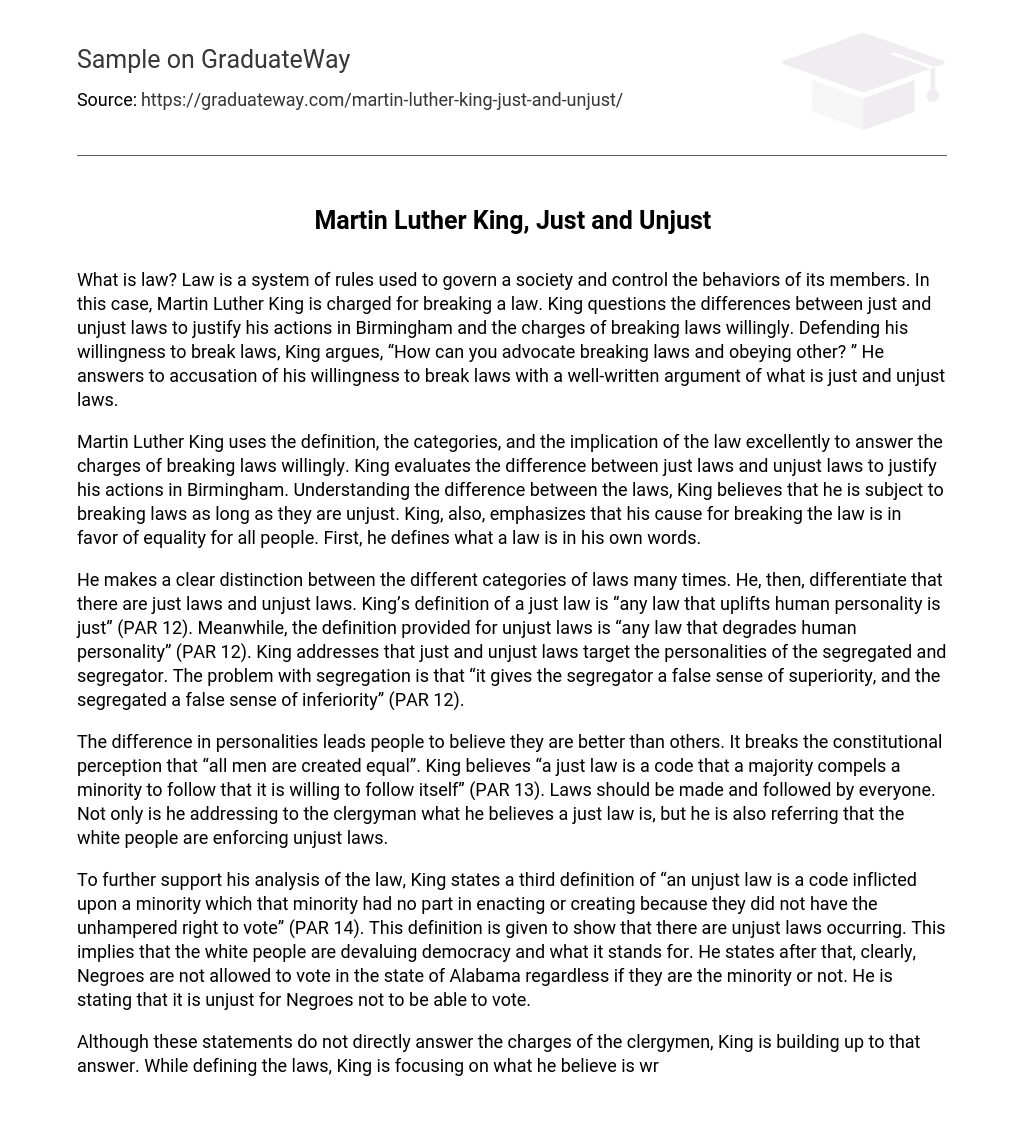Law is a set of regulations that govern society and manage individual conduct. Martin Luther King stands accused in this scenario of violating a law. Nonetheless, King challenges the distinction between fair and unfair laws to rationalize his actions in Birmingham and his readiness to defy legal statutes. Furthermore, King defends his act of disobedience by questioning how one can support breaching particular laws while complying with others. He proceeds to deliver a coherent argument contemplating the concept of just and unjust laws.
Martin Luther King effectively addresses allegations of intentionally violating laws by incorporating the definition, classifications, and consequences of the law. He defends his actions in Birmingham by examining the differentiation between just and unjust laws. According to King, he is willing to participate in civil disobedience when confronted with unjust laws. Furthermore, he highlights that his intention behind breaking the law is to advocate for equal rights for everyone. Initially, he offers his own understanding of what qualifies as a law.
King differentiates between various categories of laws and classifies them as either just or unjust, emphasizing this point multiple times. He explains that a law is considered just if it elevates human dignity, while an unjust law diminishes it. King emphasizes that both those who are subjected to segregation and those who enforce it experience the effects of these laws. Segregation creates a misguided perception of superiority for the segregator and a false belief of inferiority for the segregated (PAR 12).
The variation in personalities causes individuals to perceive themselves as superior to others, contradicting the constitutional notion that “all men are created equal.” King argues that a just law is one that the majority forces the minority to abide by, while also being willing to adhere to it themselves (PAR 13). Laws should be established and followed by all individuals. King’s message not only addresses the clergyman’s understanding of a just law, but also highlights the white community’s enforcement of unjust laws.
In support of his analysis, King provides a third definition of an unjust law: “an unjust law is a code inflicted upon a minority which that minority had no part in enacting or creating because they did not have the unhampered right to vote” (PAR 14). This definition highlights the existence of unjust laws and suggests that white individuals are undermining democracy and its principles. King then explicitly states that Negroes in Alabama are prohibited from voting, regardless of their minority status. He asserts that this denial of voting rights is unjust.
Despite not directly addressing the charges of the clergymen, King is preparing to do so. He emphasizes what he considers wrong and its connection to unjust laws while defining them. This approach is used by King to justify breaking unjust laws in order to uphold just laws. By responding to the question about advocating law-breaking with another question, King defends his willingness to break laws. It is worth mentioning that King was arrested in Birmingham, AL for participating in a parade without a permit.
The ordinance used against King was considered unjust as it violates citizens’ right to the First Amendment. King’s arrest serves as an exemplification of both breaking laws and abiding by others. He acknowledged the charges of law-breaking, yet emphasized that it was an unjust law that had been violated. King’s readiness to face the consequences for his actions exposes the unfairness of unjust laws. He further strengthens this notion by pointing out that throughout history, many individuals have employed similar strategies, citing the instance of Christians enduring punishment rather than complying with the unjust laws of the Roman Empire.
King employs the religious backgrounds of the clergymen as an example to establish a stronger connection between their beliefs and his own actions and goals. Additionally, he cites Socrates’ utilization of civil disobedience in pursuit of academic freedom and advancement. This comparison allows the general audience to draw parallels between King’s own civil disobedience and that of Socrates. By referencing these accomplished individuals, King offers examples that have been widely regarded as benefiting humanity. He links the actions of notable figures from our history who challenged unjust laws to his own endeavors.
The examples provided above lend a greater sense of intention to King’s penalty, expanding the intentional act of disobedience beyond the viewpoint of individuals divided by race. Instead, King’s purpose transforms into a struggle for the advancement of all humankind. Through his participation in civil disobedience against unfair laws, he displays utmost regard and comprehension for the law. King intricately links segregation and unjust laws to impeding human progress. In his writings, King repeatedly emphasizes his awareness of the repercussions of his actions and consistently redefines the notion of law.
By demonstrating his critical thinking abilities, he presents to his audience an analysis of his actions. Moreover, he defends himself by showcasing his ability to discriminate between a just and an unjust law. In this manner, he substantiates the legitimacy of his disobedience towards the law. King explicitly communicates that he is not impulsively or ignorantly acting out. Rather, he is challenging a law which in his view devalues human worth. This legislation not only undermines personal moral principles but also contradicts the fundamental tenets outlined in the Constitution on which all American citizens depend.
King’s objective is to expose the discrimination resulting from these laws. Through willingly accepting punishment for his actions, King shows that not all US laws are unjust and emphasizes the importance of obeying specific laws. His goal is to demonstrate to his audience that while our country has many commendable laws, there are still some in need of improvement. These laws hinder the progress of black individuals and impede societal advancement as a whole. Ultimately, these laws hinder humanity from reaching its maximum potential and serving the greater good.





